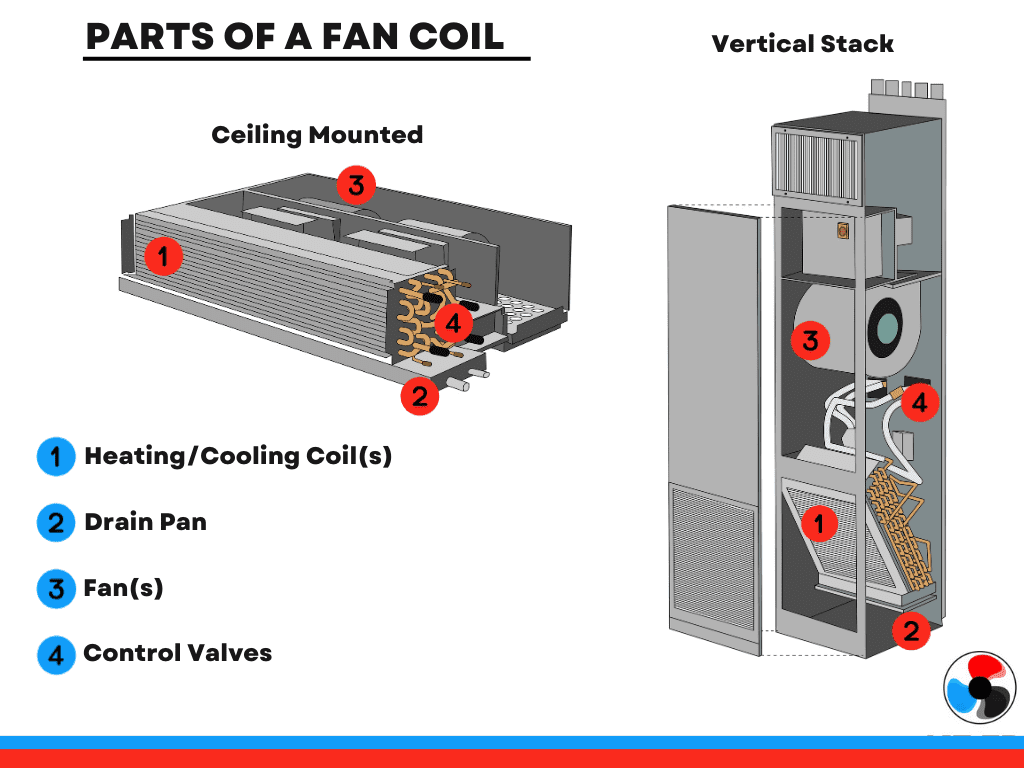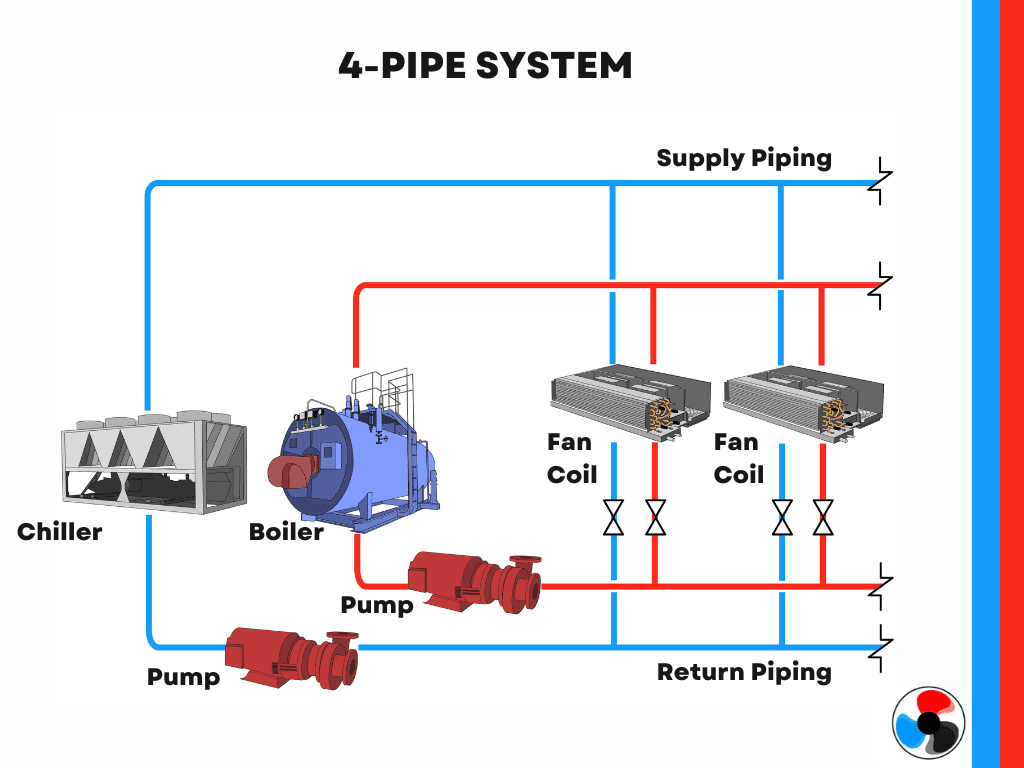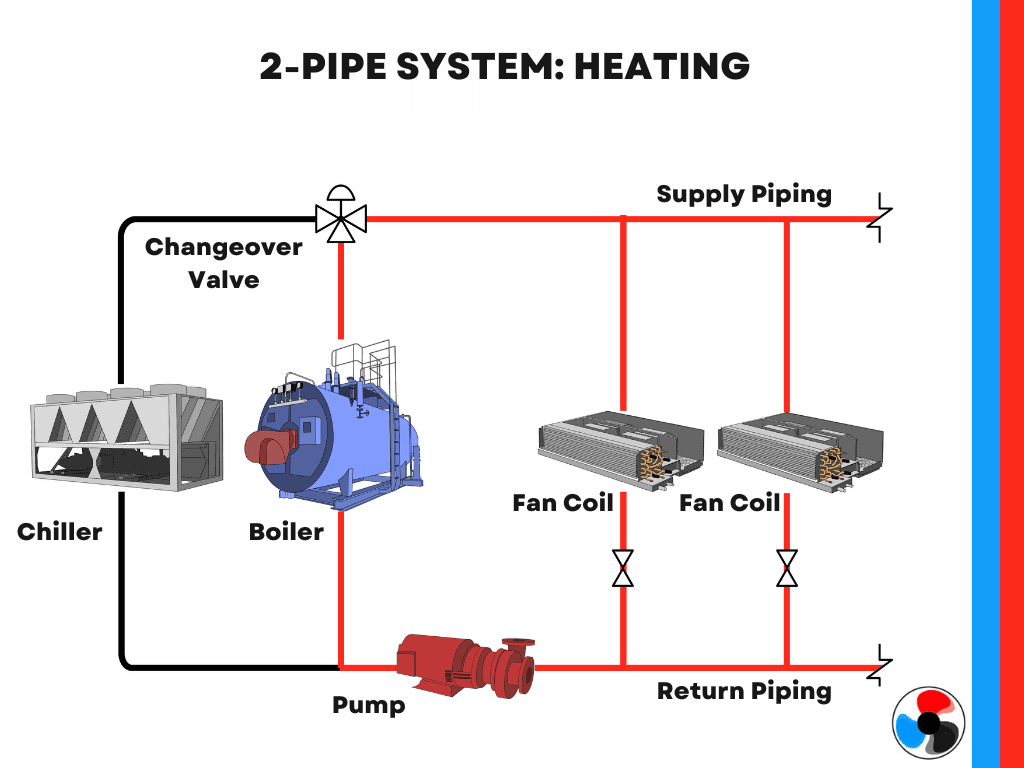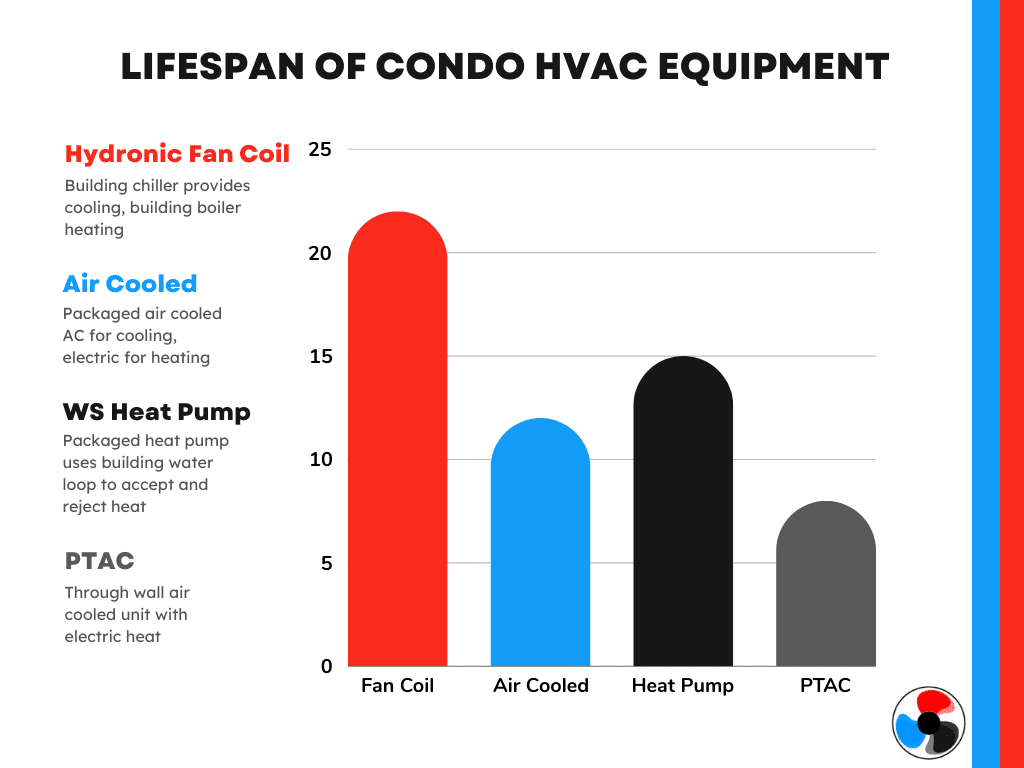Condo fan coil units are hydronic systems that rely on the building’s mechanical infrastructure to provide chilled & hot water for the purpose of heating & air conditioning in condos. Condo Fan Coil systems are dependent on the following mechanical systems:
- Chiller, which chills the water
- Boiler, for heating the water
- Pump, to move the water through the system
- Water supply & return piping
Low-rise & high-rise condominiums can reduce common element energy costs usage by choosing the right chiller and boiler for the building. These systems benefit from economies of scale by delivering heat/cooling to the entire building. Larger chillers can achieve efficiencies of 16-21 EER, the ratio of cooling delivered per unit of energy used. Larger natural gas boilers can achieve efficiencies of over 90%.
Here is how in-suite fan coil units excel in comparison with other in-suite HVAC systems in many criteria by providing the condo owner with the quietest, most controllable in-home system for maximum comfort.
- Comfort: Temperature, Humidity, & Noise
- Service & Replacement: cost, simplicity, & Serviceability
- Energy Saving: Efficiency, Reliability, & Complexity
How Does a Condo Fan Coil Unit Work?

A fan coil is as simple as it gets: a fan, coil, and an actuated valve to control the water to the coil. A drain pan underneath the coil will capture any condensate from the coil during cooling. When the space thermostat calls for cooling, the valve will open to deliver chilled water to the coil. The fan will blow the hot room air across the cold coil. The air leaving the coil is cooled to ~55 degrees and delivered to cool the room. Any condensation from the cooling coil is captured in the pan and routed to a drain. For heat, a fan coil uses either the same cooling coil, a separate hydronic heating coil, or an electric heating coil. The system will activate the appropriate coil based on the thermostat setting.
The available equipment will come in different sizes to meet the space’s needs. The most typical sizes in condominium developments are:
- 3/4 Ton – 300 CFM
- 1 Ton – 400 CFM
- 1 1/2 ton – 600 CFM
- 2 Ton – 800 CFM
Quiet Comfort: Using Fan coils to maximize energy efficiency, flexibility, and serviceability for condo HVAC systems
The simple design lends itself to many different configurations for any application. Fan coils can fit above the ceiling, under a window, or in a small closet. This flexibility allows architects to choose a configuration to meet the needs of their project.
The fan coil provides building owners with options, and the various configurations enable engineers and developers to choose the best building systems for the project.
The Benefits of 2-Pipe vs. 4-Pipe Fan Coil Systems For Condos
In a 2-pipe fan coil system, the water supply is switched from cooling to heating in the winter using the same supply & return piping. This system type is called a 2-pipe system because the building has two pipes, one to supply the coil and one to return the water to the building system. The benefit of the 2-pipe system is a reduction in initial construction costs by eliminating a set of pipes in the building and a coil from each fan coil unit. They also save money since the whole building is optimized to work in air conditioning or heating simultaneously. The downside of a 2-pipe system is that all units in the building are either on cooling or heating; there is no in-between.
When the fan coils have a separate hydronic coil, the building will have a separate water piping system for chilled or hot water distribution. This is called a 4-pipe system, which is more expensive for the building because it requires additional supply and return pipes for heating or cooling all year round. In other words, 4-pipe fan coil units enable homeowners to use heat or cool simultaneously.


Quiet Efficiency: The Silent HVAC Solution For Condominiums
The fan coil’s simplicity provides the occupant with the quietest operation. Compared to other condo HVAC systems, the cooling and heating coils usually operate with minimal noise. The only noise coming from the unit is the fan. Many alternatives to fan coil systems, such as heat pumps, require a compressor, which adds noise to the cooling/heating system. Most configurations have the fan coil either above the ceiling or in a closet, further reducing the noise in the condo.
When designing an HVAC system, engineers must select equipment that covers the maximum heating/cooling load possible for the space. Most of the time, the space only requires part of the design load. With the latest fan technology, ECM Motors, control valves, and thermostats, the fan coil can provide the exact cooling/heating required at any moment. As the motor and valves reduce their supply, the system becomes more efficient and quieter. In more humid climates or times of the year, the combination of cooling and heating can fully control humidity in the space without compromising occupant thermal comfort.
Condo Air Conditioning Alternatives
Alternatives to fan coil systems include an air-cooled packaged unit, water source heat pumps, or air-cooled split systems. These systems rely on a compressor within the condo to provide the cooling and heating, resulting in a noisier and more complex system in the residence. For cooling, they cannot reach the efficiency of the larger chillers that serve the entire building. Heat pumps do achieve higher efficiencies during heating. However, they use electric energy, which is more expensive than natural gas, which larger boilers use.
Systems that rely on a compressor are generally controlled by turning it on or off. They cannot take advantage of slowing down to meet the needs only when the space is in partial load conditions. While these units can be efficient, they only work when the space requires a design load.
Fan Coil Ease of Maintenance: Low-Cost Technology Improvements

When service is required, the simplicity of the fan coil wins again. Replacing a fan, coil, or valve is less costly than any unit in a refrigeration system required by the alternatives. Though these upgrades will be few and far between. Fan coil units have the longest life of all systems, averaging 20-25 years of service.
When replacing an older fan coil system, it is easy to implement the latest upgrade to the latest technology. A new fan, motor, valve, and thermostat result in a system achieving the highest comfort and efficiency.
Home Trade Standards specializes in servicing and replacing fan coil systems and is an expert in repairing and maintaining these systems.
Overall, the fan coil system for your condominium project provides the highest cooling efficiency, maximizes occupant comfort at all heating/cooling loads, is quieter, and is easier to service. Ultimately, it is an excellent choice for providing your customers with the highest-quality system.













